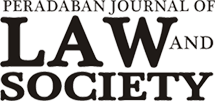Publication Ethics
The publication ethics of the Peradaban Journal of Law and Society are based on criteria generally recommended by the Committee on Publication Ethics (COPE) and uphold the highest standards of ethical behavior in all aspects of publication. All parties involved in the publication process, including authors, peer reviewers, and editors, are expected to adhere to the following ethical guidelines:
Authors:
- Adherence to Guidelines: Authors must comply with the journal's publication requirements and follow the applicable author guidelines.
- Originality and Integrity: Authors warrant that their manuscripts are original works, free from plagiarism (defined in accordance with international academic standards), and presented with honesty, avoiding data fabrication or falsification.
- Exclusive Submission: Authors commit to not submitting the same manuscript to any other journal during the review process at the Peradaban Journal of Law and Society.
- Clarity of Methodology: Authors should clearly and unambiguously describe their research methods to enable validation by other researchers.
- Ethical Conduct in Research: Research must be conducted ethically and responsibly, adhering to all relevant laws and guidelines, including ethical approval for studies involving human or animal subjects (where applicable).
- Responsibility for Content: Authors bear full responsibility for the content of their submitted and published work.
- Reporting Errors: Authors are obliged to promptly notify the journal editor if they discover any fundamental errors or inaccuracies in their published work and to cooperate in the process of retraction or correction.
- Disclosure of Conflicts of Interest: Authors must disclose all relevant potential conflicts of interest that could influence the interpretation of their research results (e.g., funding sources, institutional affiliations, personal relationships).
Peer Reviewers:
- Expertise and Timeliness: Reviewers should only assess articles within their area of expertise and commit to providing timely reviews.
- Constructive Feedback: Reviewers must offer clear, constructive feedback supported by relevant arguments. Insulting or unfounded comments should be avoided.
- Confidentiality: Reviewers are obliged to maintain the confidentiality of the review process and not disclose details of the discussion to external parties.
- Avoidance of Misuse of Information: Reviewers are prohibited from using information obtained during the review process for personal or organizational advantage.
- Objective Analysis: Reviewers should analyze manuscripts objectively, without being influenced by the origin, beliefs, gender, or other characteristics of the author.
- Disclosure of Conflicts of Interest: Reviewers must disclose to the editor any potential conflicts of interest that could affect the objectivity of their review and decline the review assignment if such conflicts are significant.
- Accurate Personal Information: Reviewers should provide accurate personal information corresponding to their expertise.
Editors:
- Non-discrimination: Editors ensure that manuscripts are evaluated based on their intellectual content without discrimination based on author characteristics.
- Originality Check: Editors utilize appropriate software to assess the originality of manuscripts and detect potential plagiarism.
- Decision Making: Editors make decisions (accept, reject, request revision) based on the journal's requirements and the objective recommendations of peer reviewers.
- Blind Peer Review: Manuscripts are sent to peer reviewers through a blind review process to ensure objective recommendations.
- Confidentiality: Editors maintain the confidentiality of all submitted manuscripts.
- Avoidance of Misuse of Unpublished Material: Editors will not use unpublished materials disclosed in submitted manuscripts for their own research without the explicit written consent of the author.
- Handling Allegations of Misconduct: Editors are responsible for taking reasonable and appropriate action in response to allegations of publication misconduct in accordance with COPE flowcharts. This may include contacting the authors and/or their institutions, and taking necessary corrective actions, such as publishing corrections or retracting articles.
- Disclosure of Editor Conflicts of Interest: Editors must disclose any potential conflicts of interest they may have and ensure that the editorial process is conducted fairly and without bias.
These guidelines aim to ensure the integrity, credibility, and ethical conduct of all parties involved in the publication process of the Peradaban Journal of Law and Society, which is based on the principles of publication ethics recommended by COPE.



